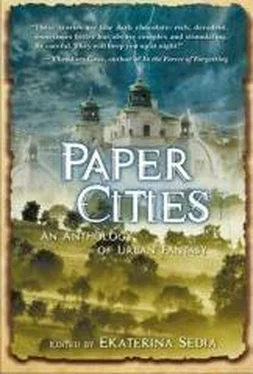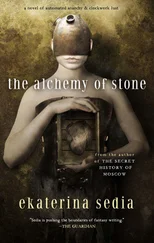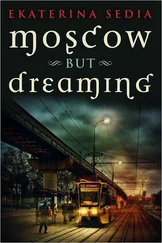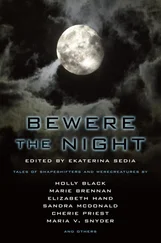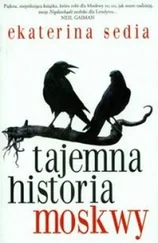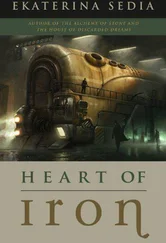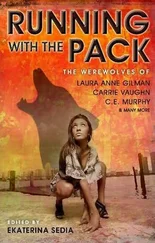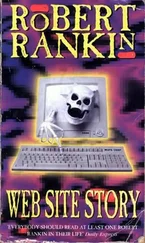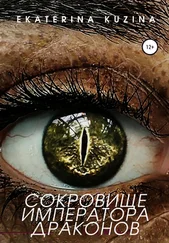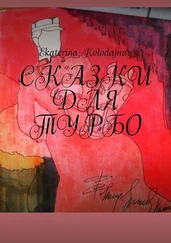Ekaterina Sedia - Stories
Здесь есть возможность читать онлайн «Ekaterina Sedia - Stories» весь текст электронной книги совершенно бесплатно (целиком полную версию без сокращений). В некоторых случаях можно слушать аудио, скачать через торрент в формате fb2 и присутствует краткое содержание. Жанр: Современная проза, на английском языке. Описание произведения, (предисловие) а так же отзывы посетителей доступны на портале библиотеки ЛибКат.
- Название:Stories
- Автор:
- Жанр:
- Год:неизвестен
- ISBN:нет данных
- Рейтинг книги:3 / 5. Голосов: 1
-
Избранное:Добавить в избранное
- Отзывы:
-
Ваша оценка:
- 60
- 1
- 2
- 3
- 4
- 5
Stories: краткое содержание, описание и аннотация
Предлагаем к чтению аннотацию, описание, краткое содержание или предисловие (зависит от того, что написал сам автор книги «Stories»). Если вы не нашли необходимую информацию о книге — напишите в комментариях, мы постараемся отыскать её.
Stories — читать онлайн бесплатно полную книгу (весь текст) целиком
Ниже представлен текст книги, разбитый по страницам. Система сохранения места последней прочитанной страницы, позволяет с удобством читать онлайн бесплатно книгу «Stories», без необходимости каждый раз заново искать на чём Вы остановились. Поставьте закладку, и сможете в любой момент перейти на страницу, на которой закончили чтение.
Интервал:
Закладка:
“You’re shitting me.”
“See for yourself.” Willow moved the sheaf of papers toward Andre. “See? This is all corn, but this little bugger is cauliflower. Except for this G and that A.”
Andre nodded. “Don’t tell me. We used the cauliflower mosaic virus as a vector for this one.”
Willow did not comment on stating the obvious. Instead, she thought of the viruses-always multiplying, always mutating-especially in Alaska, so close to the polar ozone hole. The rest of the country was even worse off, with its scorched land and tepid oceans, with its heat and dust storms, but here… Willow shook her head. Not even glass and cement of the Institute could keep them contained.
“What?” Andre said.
“Do you ever think that viruses made us bring them here?”
He stared at her, unsure whether she was joking. “Made us bring them here how?”
“By making us smart. Too smart for our own good, so we messed up everything, and the viruses are our only hope, and we put them into every living thing, we give them new genes to carry around from organism to organism, we make UV radiation so high that they mutate like there’s no tomorrow.” She bit her tongue.
“Viruses made us smart?”
“Why not? We use them to make things better, to shuffle genes about. They could’ve done it on their own. The unseen force of evolution.”
He sat down, rubbing the bridge of his nose with two fingers. “It’s possible, I guess. But what do we do with the dwarf?”
“Start over.”
Andre made a face. “You sure we can’t fix this one?”
Fix virus with virus, Willow thought. And why wouldn’t they? She was doing the same thing-she introduced a virus into her body to counteract the effects of the one her parents put in her. She imagined that virus when she was a kid. In her mind, she pictured it taking her melanin genes and twisting them into little black coils, tight like braids of her old neighborhood friends, so they would lie dormant and not betray her blackness to the world. Now, quite grown up, she imagined the virus untwisting them, she imagined the pigment seeping through her cells, reaching the surface of her skin, coloring her-like a letter written in milk, she was just waiting for the right stimulus to reveal her hidden meaning. She was white paper, and the black viral letters would soon become bright enough to read.
“ Willow?”
“I suppose,” she said. “Maybe. ‘Fire with fire’ is our motto, right?”
Andre looked puzzled. “I don’t think you’re having a good day.”
“I’m having a great day,” Willow said, and stood. “I’m going to the greenhouse.”
“Grab me a tray of EB-A seedlings, will you?” It was Andre’s pet strain; he called the seedlings ‘babies.’
“Sure thing. How’re your babies doing, by the way?”
Andre sighed. “Tumorously. If that’s a word.”
“It should be.”
In the greenhouse Willow walked along the aluminum benches with rows of trays housing green sprouts. Each tray bore a label indicating its strain and growing conditions-with traditional agricultural soils gone to dust or underwater, everyone at the institute worked hard to create corn that would grow in the peat and sand of Alaska.
Willow sighed as she ran her fingers along the tender stems. Poor plants, she thought, they don’t know what they are and don’t remember what they’re supposed to be. The only choice they have is to grow blindly in every direction, whipped by viruses that changed them with their alien will. Tumorously.
Willow caressed the fabric of the caftan, gingerly tracing the pattern of blue and orange stripes. It seemed too loud, too boisterous. Expensive, too, ever since all cotton had to be imported from Canada. Nonetheless, she put it on.
“It looks good,” said the store clerk the moment Willow stepped from behind the curtain of the dressing room.
The woman in the mirror seemed as foreign as the caftan that slithered along her body, shifting and shimmering with every breath. The woman with dark glossy skin. Willow did not belong inside either of them; she could not take off her skin, and so it was the dress that had to go.
“Didn’t like it?” said the store clerk when Willow, back in her white blouse and blue slacks, handed her the caftan. “Too bad; it looked really good on you.” She smiled wistfully, a pale freckled girl. “I wish I could pull off wearing something like that.” She clamped her hand over the startled ‘o’ of her mouth. “I didn’t mean it in a bad way.”
“I know,” Willow said, smoothing her short hair. “Don’t apologize. And it’s a nice dress, but I couldn’t wear it for work. And I don’t go anywhere else.”
The store clerk nodded. “I understand. And I’m sorry.”
Willow bought a white blouse and a pair of long, jangly earrings to combat her guilt. She felt fake, undeserving.
She walked home. In these high latitudes, darkness all but disappeared in the summer. Nine P.M., and the sun still shone through the thick haze surrounding it. Even at night there was no respite from the radiation.
Willow hated to imagine what happened to the rest of the country. With Florida submerged and Pennsylvania a thirsty, cracked desert, with dustbowls and tornadoes, they were lucky to have a place to go. After Alaska, there would be nothing left. They had to make do.
Science can fix everything; didn’t they promise her that? Didn’t she become a scientist because she believed that scientists solved problems? Survival, she reminded herself. They had to feed what was left of the population-twenty million? Ten? The government didn’t publish the latest census data. They had trouble enough keeping the trains running between Alaska and Canada, and trading what remained of the oil in the former ANWR for goods and research funding. Suddenly, science wasn’t a search for truth; it became a search for food and for continuing life. What could be more important than that?
When she got home, she tried her new earrings on and cried. Her tearstained eyes glanced at her hand, and she contemplated it a while-deeper dark around the fingernails and in the creases of the joints, lightening at the phalanxes, and pink at the palm. Tiny moons of her fingernails seemed to hover above the darkness of her fingers. She cried for herself and for her poor corn plants, which she could not make better. The plants whose soul was eaten away by the viruses, and nothing could restore it to them, not even viruses themselves. They died because there was nothing for them to be; she feared to continue this thought and played with her earrings instead.
The next day she came to work early and ran the labyrinth of glass corridors and elevators to the safety of her lab like a gauntlet. She wanted to be in the comfort of her equipment, in the shared misery of her plants. Before she could turn the thermocycler on, someone knocked at the door.
Willow jolted upright and fought a sudden urge to cover her face with her hands. Through the glass door, she saw the smiling face of Emari from the transposon lab down the hall.
“Come in,” Willow said.
Emari grinned and entered. “Going to the conference in Anchorage next week?”
Willow shook her head. “I have nothing to present. The dwarves wouldn’t stabilize. What about you?”
“I’m going,” Emari said. “We found some freaky stuff with Mu21. It just loves that UV light. Loves it. And I think if we move to transposable mutagenesis, we might be able to dispense with viral vectors altogether.”
“Trying to put me out of work?”
Emari laughed. “Of course not; we’d never lose such a good gene jockey as you. What do you care about the vector? Just make us new mutations, and our little Mu will take care of them.” She grew serious. “Besides, Andre tells me that you’ve had some thoughts about viruses that were… let’s say, not very flattering.”
Читать дальшеИнтервал:
Закладка:
Похожие книги на «Stories»
Представляем Вашему вниманию похожие книги на «Stories» списком для выбора. Мы отобрали схожую по названию и смыслу литературу в надежде предоставить читателям больше вариантов отыскать новые, интересные, ещё непрочитанные произведения.
Обсуждение, отзывы о книге «Stories» и просто собственные мнения читателей. Оставьте ваши комментарии, напишите, что Вы думаете о произведении, его смысле или главных героях. Укажите что конкретно понравилось, а что нет, и почему Вы так считаете.
